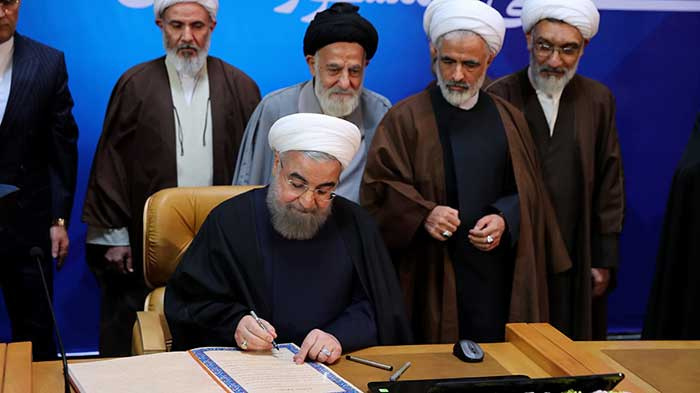Rouhani’s charter of citizens’ rights: a dream come true?

“One of my dreams has come true,” Hassan Rouhani said in an address before the unveiling of the Charter of Citizens’ Rights.
Ordinary people, opponents of Rouhani and even his advocates however, did not share his view. Many complained that charter had gathered together a series of rights already acknowledged in the constitution but fails to guarantee their enforcement, as previous administrations have.
In an interview with pro-reform newspaper Shargh Daily published on December 10, Rouhani’s special aide in citizenship rights Elham Aminzadeh said the administration did not intend to pass the charter as law from the beginning. Rouhani Meter, a dedicated website that evaluates the output of the Rouhani administration, puts a false tag on the claim, for good reason.
“You know that in the election campaign that recently took place, I insisted on an issue which I called the citizenship charter. I promised the people to put together and publicize a citizenship charter which I would then present as a bill to legislate on and to allow our society to settle many of the problems that it faces right now,” President Rouhani had told CNN’s Christiane Amanpour in September 2013, almost a month since he took office in Presidential Palace in Pasteur Street.
Most observers agree that the charter is good in legal writing but is not binding. In an op-ed published on Tuesday in Shargh, law expert Kambiz Norouzi hailed the legal writing of the charter compared to its previous editions but said the problem with the charter was it was not a law, hence not binding.
“The Charter on Citizens’ Rights could be considered as the President’s views, prepared and declared, to which, institutions affiliated with the executive branch are only morally bound to pay attention because of the president’s status and as his colleagues” Norouzi wrote. “Therefore, if an institution violates the views incorporated into the Charter, it will have no legal accountability. This would weaken the Charter on the one hand and make the President’s moral and political responsibility heavier on the other hand.”
Rouhani himself distinguished the Charter from the constitution and stressed that it could facilitate the enforcement of the constitution’s Principles 113, 134 and 121. Acknowledging his heavy duty, he reiterated that Principle 113 has put the president in charge of enforcing the constitution.
The charter’s full text (here) has acknowledged the rights to life and welfare, peace and security, sustainable development, privacy, housing, equality, freedom of expression, transparent economy, access to the internet, employment, education, and healthcare among others.
In their reactions to the unveiled Charter, the Principlists have found their own alternatives, too. Most of their online outlets questioned resources used to cover the costs of SMS messages that appeared on Iranians cellphones inviting them on behalf of the president to become acquainted with their own rights as citizens, with a link to the Charter.
Abdullah Ganji, editor-in-chief of Javan Daily, affiliated with IRGC, compared the Charter with Plato’s Republic and Hobbes’ Leviathan but predicted that it will also remain as a conceptual utopia. He questioned the possibility of the Charter’s enforcement as the legal institutions including the Judiciary, the parliament, the Expediency Council and the Supreme Leader have not endorsed it. Calling the publication of the text a bid to collect an easy achievement for the Rouhani administration, Ganji wrote the objective behind was for the government to maintain the appearance of dedication to rights for the outward-looking domestic elites and to prove its civility to the West.
On a more innovative note, Kayhan’s Hossein Shariatmadari told likeminded Fars News Agency that the ‘valuable’ items included in the Charter are already mentioned in the constitution and Rouhani’s emphasis on them could imply the accusation that the establishment has failed to observe them. In yet another U-turn, he said that the Charter should be called the ‘list of [necessary] measures not undertaken by the administration’. Drawing on Article 24 of the Charter, Shariatmadari criticized the administration for its failure to protect public property, manipulating statistical reports, vitriol against critics, and unapologetic attitude over the nuclear deal. “What was really unveiled on Monday morning was proof of the administration’s inefficiency,” he added.
Many have also called the unveiling as a campaigning strategy to re-involve Rouhani’s pro-reform social base ahead of the presidential race next year.
The ebb and flow of human rights in the history of the Islamic Republic has definitely been forward in any final judgment but also a cooling card for administrations that try to avoid conflict with other institutions over their subjective interpretations of the constitution.
The Charter of Citizens’ Rights remains all talk and no action until it goes through all the required stages to become law. Writing it has taken the Rouhani administration about four years. Could the administration cooperate with the other branches of the government for its legislation in little more than four months now? It may do for the parliament, but as for the Judiciary, no official was invited to the unveiling ceremony as far as we know.

